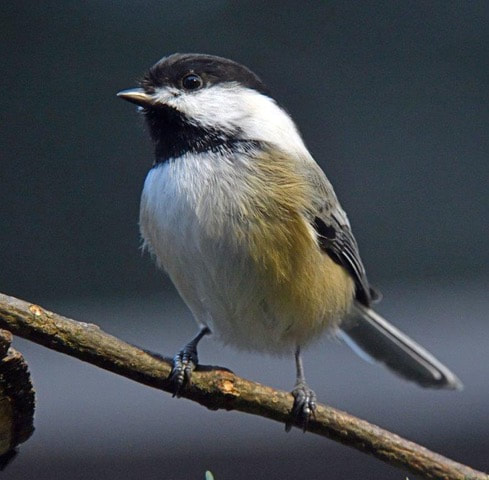|
When I first saw the black - capped chickadees coming to my open feeder this winter I was surprised. I looked back in my notes from last year to check. There were no black - capped chickadees included in the lengthy list of birds I had seen (a list that also included the mountain chickadee). The b/c chickadees are such friendly little birds that it is easy to train them to eat out of one’s hand. And they are one of the few birds that greet me with an enthusiastic “chick a dee dee” chirp whenever I appear with sunflower seeds. I am particularly happy to see this species here in New Mexico, because Audubon says that the Black capped chickadees are moving northward due to climate change/tree devastation. Fortunately they are still around my house in Maine. According to most sources (with the possible exception of Sibleys) we are not supposed to have these little birds in New Mexico but we do! The black capped chickadee although similar to the Carolina Chickadee has the sharper contrasting colors, whiter wing tips and longer tail that I am very familiar with. The mountain chickadee is easy to distinguish from the other two because of the black strip through its eye.
One fact that astounds me is that chickadees can learn the “wrong” songs, at least from a human perspective, which means we don’t know what is really going on here! This chickadee is supposedly a non – migratory species found coast to coast in the US and Canada. In the far north they lower their body temperature at night and enter regulated hypothermia to save energy. In addition these little birds store their food and have an exceptional memory that allows them to relocate cached items. Genetically, this bird’s closest relative is the mountain chickadee and sometimes the Carolina and b/c chickadees hybridize in areas where they overlap. These chickadees are most readily seen during the winter when non – breeding flocks visit backyard birdfeeders. They have a unique and efficient way of dealing with competition with each other. Each chickadee comes to the feeder, takes a seed and flies away to either eat or store it. These birds know how to share resources. Their habitat includes mixed and deciduous woods, willow thickets, groves and shade trees. Supposedly they avoid purely coniferous forests where species overlap. Black capped chickadees are tiny acrobats often hanging upside down while pecking at fat. Pairs typically form in the fall and remain together as part of a winter flock, but here by the river I have only 6 b/c chickadees in all. Nests are built in the holes of trees, in rotten wood, and they take up residence in old woodpecker holes. During mating season B/C chickadees lay 6 – 8 white eggs with incubation lasting approximately two weeks. Females cover their eggs with nest material when leaving the nest. Males also bring food to their mates during incubation. Young fledge around two weeks after birth. Normally these little birds lay one brood of eggs a year. Foods are varied and include seeds and berries as well as insects, but during summer months insects dominate with caterpillars, spiders, and snails consumed with relish. B/C chickadees also like other kinds of fruit like strawberries. I was very disappointed this winter because in January my chickadee ‘family’ simply disappeared. Just as distressing I noted no mountain chickadees visited at all. Just before I left in April I heard a couple of b/c chickadess singing in the cottonwood trees. They had been around for about a week. Are these migrants? If others have seen these delightful little birds I would really like to know. Please email me at [email protected]
0 Comments
Your comment will be posted after it is approved.
Leave a Reply. |
Submit your ideas for local feature articles
Profiles Gardening Recipes Observations Birding Essays Hiking AuthorsYou! Archives
October 2025
Categories
All
|

 RSS Feed
RSS Feed